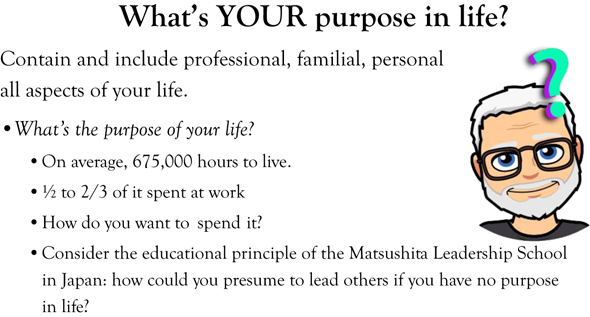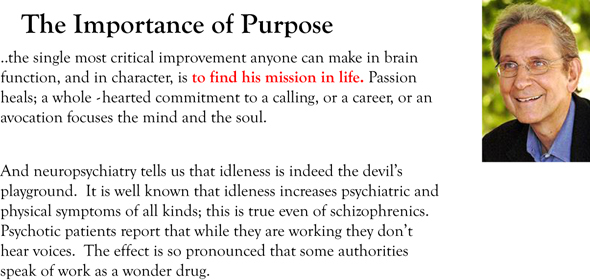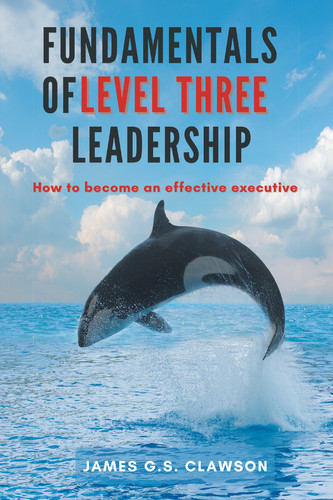Many C-level and below executives interchange strategic language with the effect of confusing people and obfuscating what’s really going on. Leaders, should, in my view, work to be:
1. Clear
2. Memorable
3. Authentic, and
4. Respectful
… in their language and communications. Strategic conversations in particular demand, I believe, clarity—else all those listening and employed and invested come away confused about what we are doing, where we are going, how we are going top’s going on.
A clear mission statement or statement of purpose is essential to developing a high-energy business. In my experience, a good mission statement is one inspiring sentence. If you give the charge to develop a mission-statement to a committee, they will wrestle and wordsmith for weeks and return with something very close to “We deliver world-class goods and services that delight our customers beyond their expectations and deliver an above-industry-average return on investment to our shareholders.” Perhaps true in some broad sense, but utterly uninspiring. And usually, disingenuous at best since the definition of world-class is seldom defined or compared with leaders.
There are those who decry the value of mission statements and the effort to define them as wasted energy. I see the argument. In its early days, Hewlett and Packard made all kinds of reactionary changes to their products until they found something customers would buy. It’s clear that an organization, for profit or not, needs to serve a clientele or it will wither and die. One could infer from that that mission statements are secondary to a broader strategy of “finding something that people want to buy.” Many people run their businesses that way. Okay. In my experience, that approach ends up in a place with weakly motivated employees who have a hard time getting energized to bust their buns to make other people rich.
The alternative is to, as has been said, create a cause, not a business. This concept is not just connecting your business to a social cause as say advocated by Olivia Khalili at CauseCapitalism35 or by Jerry Welsh in the Harvard Business Review.36
In my explorations of the relationship between feel and performance,37 I concluded that most businesses use motivation processes that leave large amounts of employee energy fallow and untapped. When one compares the energy and passion of volunteers in the non-profit sector, one wonders how if at all private sector businesses could tap into that pool of energy.
I agree that some people are chronically low energy and low motivation. Some proportion of that group have been taught to be that way. Some are perhaps never under any circumstance going to be passionate about productive activity. That said, I have come to believe that businesses could tap into that unused pool of energy in a number of ways. The book Doug Newburg and I wrote, Powered by Feel, was one attempt to explore that possibility.
At a deeper level, it seems to me that people seek purpose in life. They want their lives to mean something. Especially when they spend long hours, weeks, months, years, and decades at work. I have come to believe that it is the leader’s job, the leader’s responsibility to clarify why we are here and what we are doing, and that in fact, leaders who don’t or can’t do that are, in a word, negligent or incompetent or both.
I have also come to believe that since people seek meaning, the best way they can do that is to settle on a purpose in and of their lives. Some people are waiting to be told what that is, perhaps from God or the clergy or some mysterious mechanism including the occult. Some people with ADD or ADHD may have brain chemistry issues that make it even more difficult to settle on a mission in life.
So, ask yourself, what’s my purpose in life? Can you answer that question? If so, great. If not, I urge you to think seriously about that. To what end are you spending your on average roughly 700,000 hours in this life? If you don’t have a central purpose or mission, the odds are that you will slump into what I would call shallow attempts to entertain yourself with food, drink, television, sports, or some similar sedentary outside-in activity. If you want to energize your life, pick a purpose and begin working on it. The related question is “what do you want to create?” What will be the legacy of your life? Will it have any focus? Will there be a created or built result?
That is not to say that any endeavor to create is better than one or the other. People who build fences and dig ditches serve a valuable purpose in life as much as doctors and lawyers and engineers. There is honor in all honest work. If one has spent one’s life plumbing, building fences, driving trucks, or whatever, one can look with pride on what they have accomplished, especially if they see the mission or purpose they have fulfilled.
Some people have no stated purpose in life, yet year by year they continue to allocate their weekly allowance of 164 hours per week. One could examine those allocations and infer what one is investing in—“what you do is what you love, and what you love is what you do.”
The same is true of companies. Let’s consider some examples.
Example
Consider this example from USA Today, December 7, 3B, in which an executive vice president stated, “This is an important step in (company name)’s mission to become a global airline.” If a company’s mission to become something (a) that’s a vision, not a mission, and (b) what does that have to do with any kind of service to customers? I believe an organization’s reason for living should be something around contributing to society and its needs—unless of course the organization is organized only to serve its members. In that case, it is, to me, not a company but a self-serving club—of which there are many. Private golf clubs, for example, exist only to serve their members. Fraternities. Sororities. Home Owner Associations. And so on.
Back to the more usual private sector company, let’s consider a mundane one. Suppose you own a company that repairs automobiles. Most people would look at that and say, “Not very sophisticated, it’s a low wage, low tech, marginal business. No interest.” Managers with that set of assumptions would hire people and focus on wages, hours, and doing a good enough job.
One could take a different view. This would require understanding the underlying value of automobiles. This would require understanding laws governing automobile safety, rates of auto theft in the area, number of automobile deaths and the value of dependability to customers. That understanding (which would require doing a little homework—easily done in today’s world with a desire to do so) would allow one to explain to employees the value of automobile safety, owner identity, convenience of travel and dependability. Such a leader might conclude that “Our mission is to ‘keep people moving’ or ‘keep people safe and moving’ or ‘renew your wheels.’ Let me show you some slides of what unsafe automobiles look like. When we do a good job, we can go home at night proud of what we do. Every fender, every circuit, every system must be done perfectly to prevent possible damage, destruction and death. Hold your head high and do a good job!” What do you think? Could you create a single sentence inspiring summary of the purpose of your company or organization?
Here are some other examples of powerful one sentence mission statements.
1. We protect those who protect us. (BAES USA)
2. We make education affordable for everyone. (Sallie Mae)
3. We keep Virginia moving! (VDOT)
4. We refresh the world! (Coca-Cola)
5. “To help people find themselves” (the author based on having had three last names)
6. “To build ever more powerful and efficient rockets(?)” (Werner Von Braun)
I find these statements powerful, clear, and inspiring. Anyone in any job in those organizations could connect what they do to that one sentence, be easily able to remember it, and have pride in how they are spending their working lives. Contrast these statements with the committee-designed statement above.
I believe that leaders of nations should also be able to declare the mission of their countries. What is the purpose of India? China? Japan? Germany? The United States? Mexico? Could one declare a purpose that would inspire all citizens? Or do many leaders simply want to stay in power? In which case, there’s no tapping into that latent pool of citizen energy. The personal mission “to be in control and suck my comfort out of the populace” perhaps not stated but behaved is not one that inspires others.
Many individuals seemingly live their lives around the purpose of maximizing my leisure time. A life without purpose, though sucks energy. Coming in late, avoiding work, going home early, sitting on the couch drinking, and watching TV may be what some people want or think they want, and it’s not a productive lifestyle. Sadly, movies, plays, books, and articles tease about and accept this lazy lifestyle and make it funny and attractive. See the earlier chapter on balancing the DO-REST cycles of daily life.
Alternatively, consider these mission statements of individuals:
1. I cause people to think. (professor)
2. I protect the poor and under-served. (defense attorney)
3. I bring the facts of key events to the world. (journalist)
4. I entertain and educate people by creating powerful stories in film. (producer)
5. I create safe, comfortable transportation for millions. (highway contractor)
6. I nurture healthy, productive, well-rounded citizens. (parent)
Lily Tomlin once noted “I always wanted to be somebody … I guess I should have been more specific.”


Source: John Ratey, Shadow Syndromes, p. 363.
Challenge
1. Draft your one sentence view of the purpose of your nation. (Here’s mine for the USA: “To be a robust democracy that provides opportunity, liberty and justice equally for all.”)
2. Draft your one sentence view of the purpose of your company or organization.
3. Draft your one sentence view of the purpose of your life.
4. Assess these drafts in terms of their clarity, power to inspire, and memorability.
35 http://causecapitalism.com/why-your-company-should-have-a-social-mission/
36 https://hbr.org/1999/09/good-cause-good-business
37 https://amazon.com/Powered-Feel-Individuals-Teams-Companies/dp/9812818928/ref=mt_paperback?_encoding=UTF8&me=
